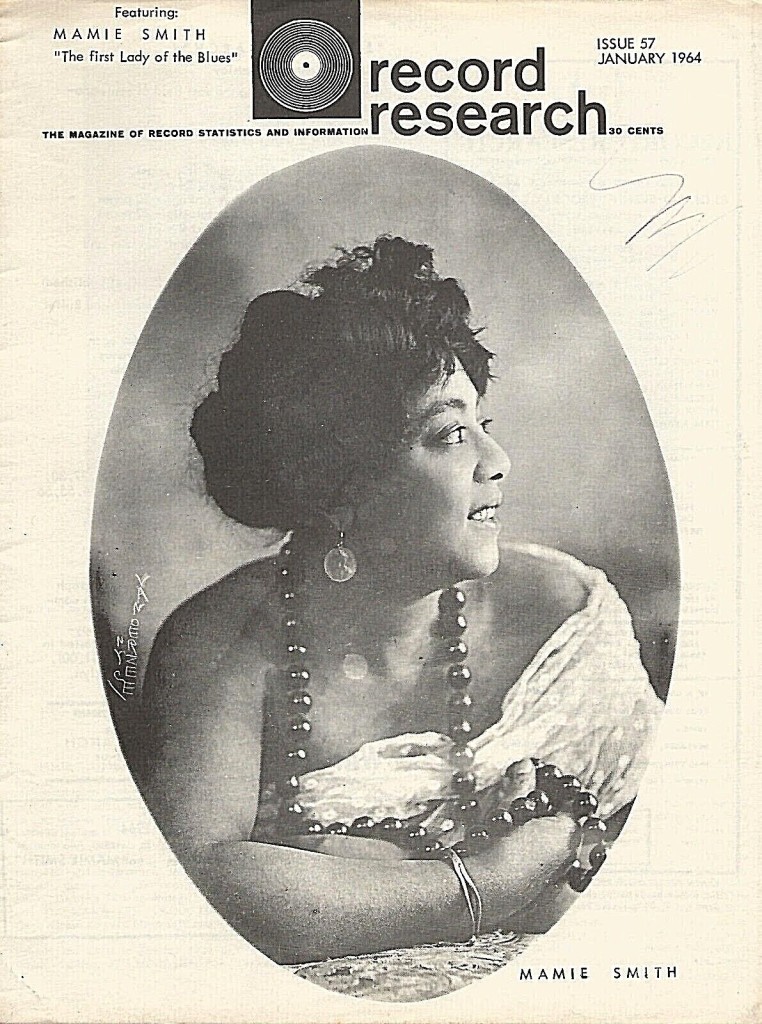 A beautiful portrait of Mamie Smith graced the entire cover of Leonard Kunstadt’s legendary publication Record Research in January 1964. The portrait by famed Harlem photographer James Van Der Zee shows a smiling Mamie Smith in profile, wearing a necklace of large black stones (or seeds).
A beautiful portrait of Mamie Smith graced the entire cover of Leonard Kunstadt’s legendary publication Record Research in January 1964. The portrait by famed Harlem photographer James Van Der Zee shows a smiling Mamie Smith in profile, wearing a necklace of large black stones (or seeds).
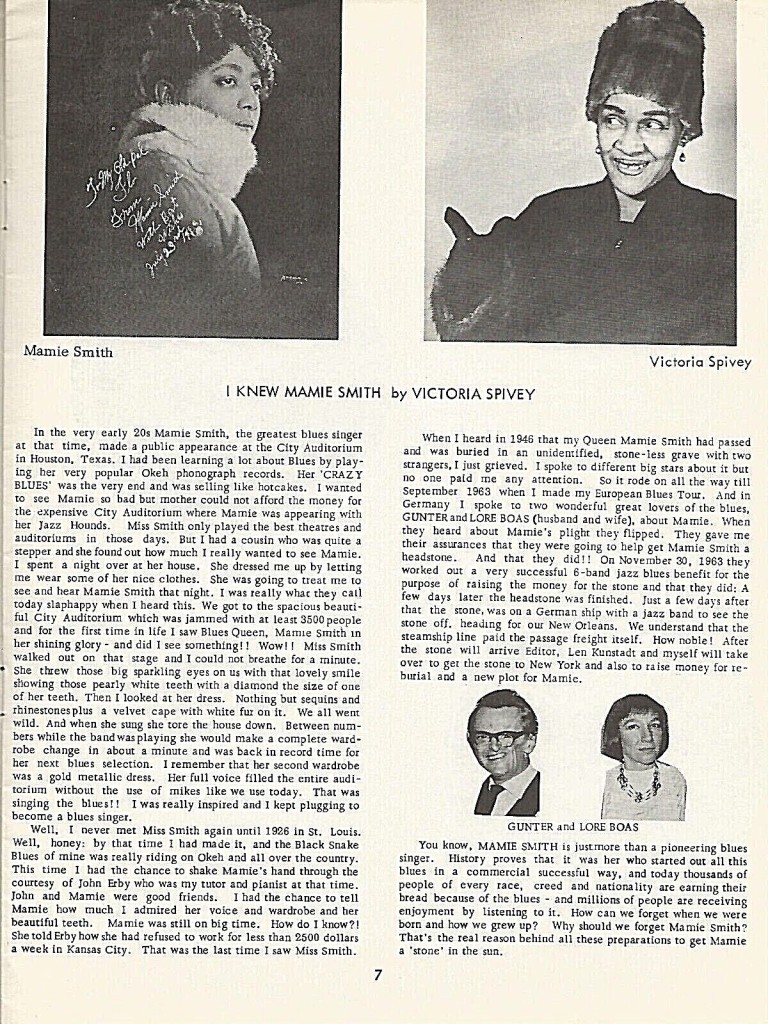 Not only was there a lavishly illustrated article written by Kunstadt (“Mamie Smith the First Lady of the Blues”), there was also an article in the same issue by Len Kunstadt’s companion, blues singer Victoria Spivey, entitled, “I Knew Mamie Smith,” which recounted Ms. Spivey seeing Mamie Smith in Houston’s City Auditorium dressed sequins and rhinestones with a velvet cape with white fur. “And when she sang she tore the house down . . . I remember that her second wardrobe was a gold metallic dress. Her full voice filled the entire auditorium without the use of mikes like we use today. That was singing the blues! I was really inspired and I kept plugging to become a blues singer.”
Not only was there a lavishly illustrated article written by Kunstadt (“Mamie Smith the First Lady of the Blues”), there was also an article in the same issue by Len Kunstadt’s companion, blues singer Victoria Spivey, entitled, “I Knew Mamie Smith,” which recounted Ms. Spivey seeing Mamie Smith in Houston’s City Auditorium dressed sequins and rhinestones with a velvet cape with white fur. “And when she sang she tore the house down . . . I remember that her second wardrobe was a gold metallic dress. Her full voice filled the entire auditorium without the use of mikes like we use today. That was singing the blues! I was really inspired and I kept plugging to become a blues singer.”
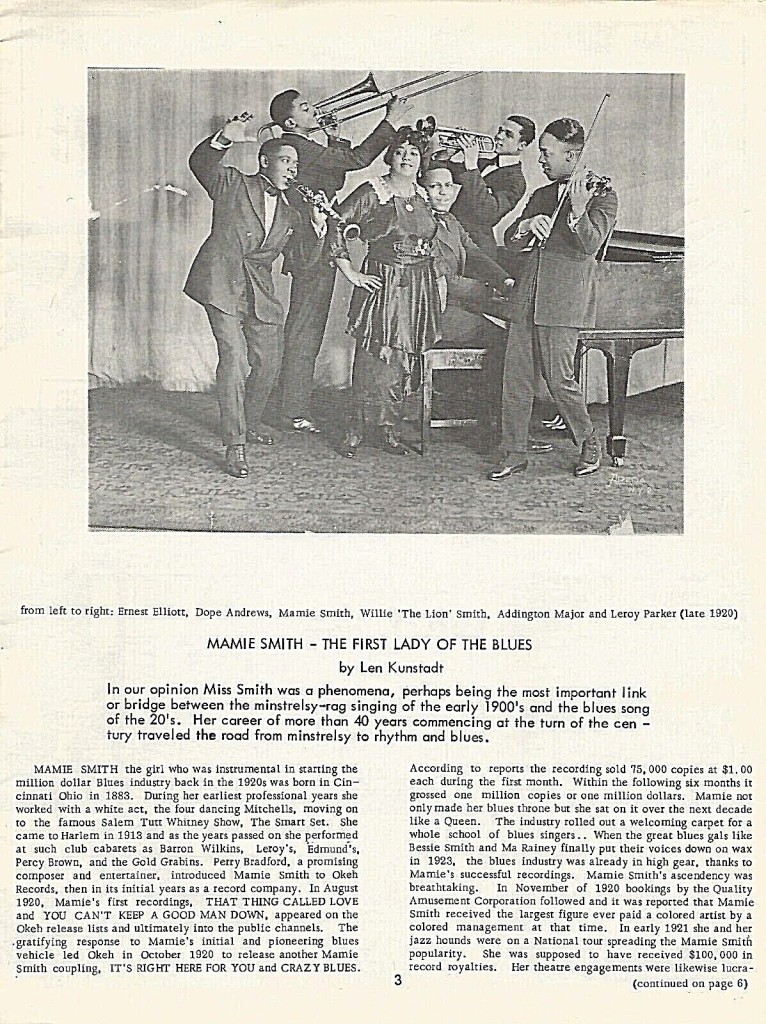 This issue of Record Research was instrumental in acknowledging the fact that, as the first African American vocalist to record the blues in 1920, Mamie Smith’s unmarked grave at Frederick Douglass Cemetery on Staten Island was an egregious lapse of world consciousness that needed to be corrected. Victoria Spivey recounted meeting husband and wife Gunter and Lore Boas in Germany during her September 1963 European tour.
This issue of Record Research was instrumental in acknowledging the fact that, as the first African American vocalist to record the blues in 1920, Mamie Smith’s unmarked grave at Frederick Douglass Cemetery on Staten Island was an egregious lapse of world consciousness that needed to be corrected. Victoria Spivey recounted meeting husband and wife Gunter and Lore Boas in Germany during her September 1963 European tour.
Gunter and Lore Boas organized a six-band jazz blues benefit held on November 30, 1963, for the express purpose of raising money for the stone. According to Victoria Spivey, a few days later the headstone was finished and loaded onto a German ship bound for New Orleans, where it arrived on December 30, 1963. Ms. Spivey concluded, “After the stone will arrive, Editor Len Kunstadt and myself will take over to get the stone to New York and also to raise money for re-burial and a new plot for Mamie.”
The next issue of Record Research (February 1964) included an article “Mamie Smith – A Further Report” which gave details of the stone arriving in New York and of a benefit organized by Victoria Spivey at the Celebrity Club at 35 East 125th Street held on January 27, 1964, with appearances by Jimmy Rushing, Lucille Hegamin, Alberta Hunter, Blue Lu Barker, Rosa Henderson, Victoria Spivey, and Maxine Sullivan.
In July 2014, Michael Cala, a blues journalist and Staten Island resident, organized a fundraising drive for a tombstone called Blues For Mamie. The end result was that on September 13, 2014, the stone was unveiled with the following inscription:
MAMIE SMITH
BLUES SINGER
May 26, 1883 – Sept. 16, 1946
BY RECORDING “CRAZY BLUES” IN 1920 SHE INTRODUCED AMERICA TO VOCAL BLUES AND OPENED THE RECORDING INDUSTRY TO THOUSANDS OF HER AFRICAN AMERICAN BROTHERS AND SISTERS.
ERECTED BY A GRATEFUL POSTERITY
A.D. 2014
Crazy Blues, recorded on the Okeh label, sold an astounding 75,000 copies within a month of its release. As was reported in the November 2, 1946, issue of the People’s Voice, the New York City African-American publication founded by Adam Clayton Powell, Jr.:
Waring Cuney and Langston Hughes, realizing the contribution Mamie Smith had made to Blues, were unhappy about her passing as is the whole country. The extent of her influence will never be known.
Although Len Kunstadt’s 1964 Record Research tribute stated that Mamie Smith was born in Cincinnati, her birthplace had been forgotten until a writer, musician, teacher, and editor named John Jeremiah Sullivan broke the news (in November of 2018) that not only was Mamie born in Cincinnati, but that her actual birthdate was May 26, 1891, and that she was born at 14 Perry Street in downtown Cincinnati, which is now 308 Perry Street, located across the street from Duke Energy Convention Center. The story can be viewed on the following You Tube link (which includes a segment of Cincinnati resident and Syncopated Times artist Joe Busam): tinyurl.com/mamiesmithbirthdate.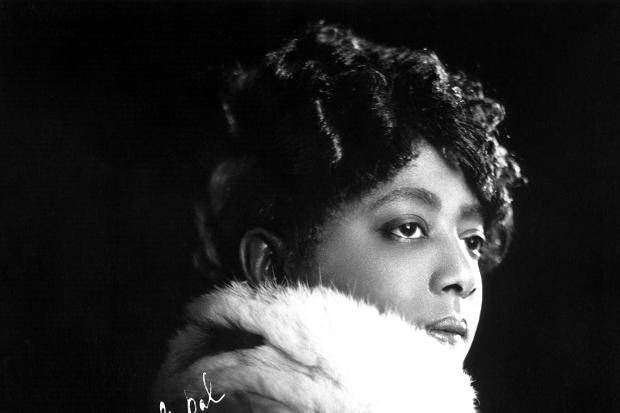
Len Kunstadt’s intention was to give Mamie Smith full acknowledgment. But his misinformation regarding Mamie’s birth date was compounded by confusion over her date of death. In Don Bedwell’s lavishly illustrated article “Mamie Smith’s Blues,” published in the April – June 2008 issue of the Ohio Historical Society’s Timeline, Bedwell says:
Mamie Smith left the world almost as enigmatically as she had entered it, with the date of her death as elusive as that of her birth. Jazz chronicler Leonard Kunstadt, relying on a disputed death certificate, places the date on September 16, 1946, at the age of sixty-three years. Others have dated her death in August, October, or November 1946.
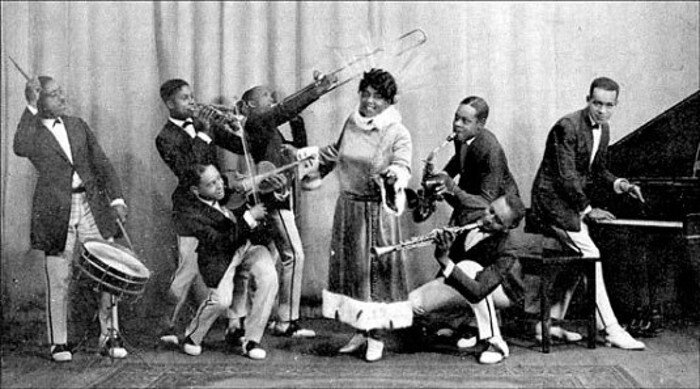
The African-American press duly noted the passing of the legendary Mamie Smith. In searching various issues of publications such as the Pittsburgh Courier, Baltimore Afro-American, Amsterdam News, The People’s Voice, etc. as well as Downbeat, I experienced a bonding with the encouraging and enthusiastic spirit of Lenny Kunstadt. Dan Morgenstern summarized his friendship with Lenny in a tribute published by David Hinckley in the New York Daily News on July 4, 1996. The title of Hinckley’s article was A Lifetime Devoted To Re-disc-overy. There was a photo captioned “Records-Keeper: Archivist Leonard Kunstadt with blues singer Victoria Spivey.” Lenny founded Record Research in the late 1950s and was still publishing from his Brooklyn home at 65 Grand Avenue. Kunstadt died at home on April 24, 1996, just three weeks shy of his 71st birthday. From David Hinckley’s Daily News article:
Dan Morgenstern, director of the Institute of Jazz Studies at Rutgers University, knew Kunstadt for close to 50 years. “He will be missed,” says Morgenstern. “He was a very important figure in a somewhat arcane field. . . . Lenny was a perfectionist,” says Morgenstern. “He was never satisfied until a fact was established beyond all possible doubt. He was also very argumentative, particularly on discographical matters. But he had a great sense of humor, and it was all part of loving what he did. He’d talk with old blues singers for hours, taking notes.”
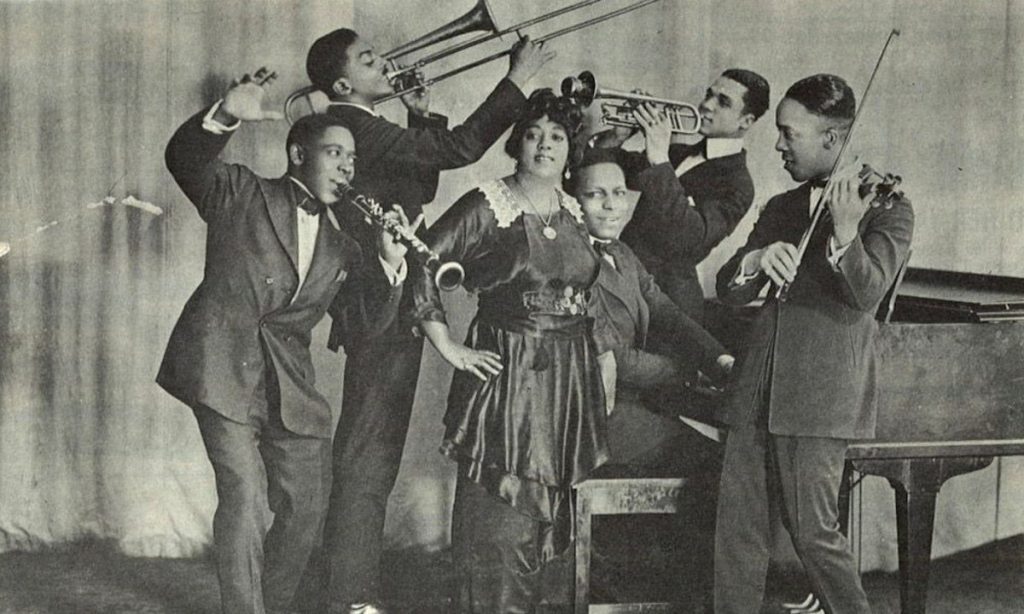
Lenny Kunstadt, it is an honor to salute your indefatigable research tradition! In that spirit, it is a pleasure to illustrate this article with a copy of the death certificate of Mamie Smith, obtained from the City of New York Department of Records & Information Services located at 31 Chambers St. in Manhattan. The informant was Mamie’s cousin, James S. Steele, who provided yet another date of birth (September 27, 1906) in Cincinnati.
FOR THE RECORD: MAMIE ROBINSON SMITH was born May 26, 1891, in Cincinnati, Ohio. She died at Harlem Hospital in Manhattan on October 23, 1946.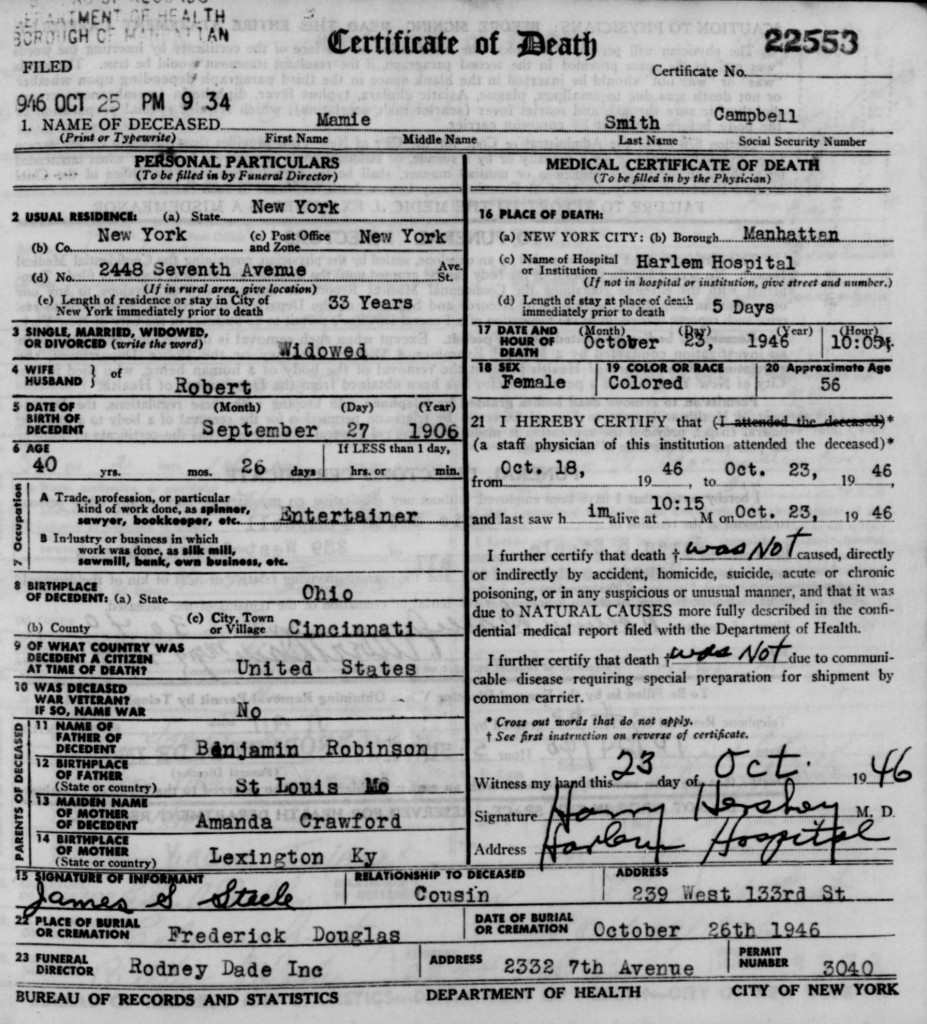
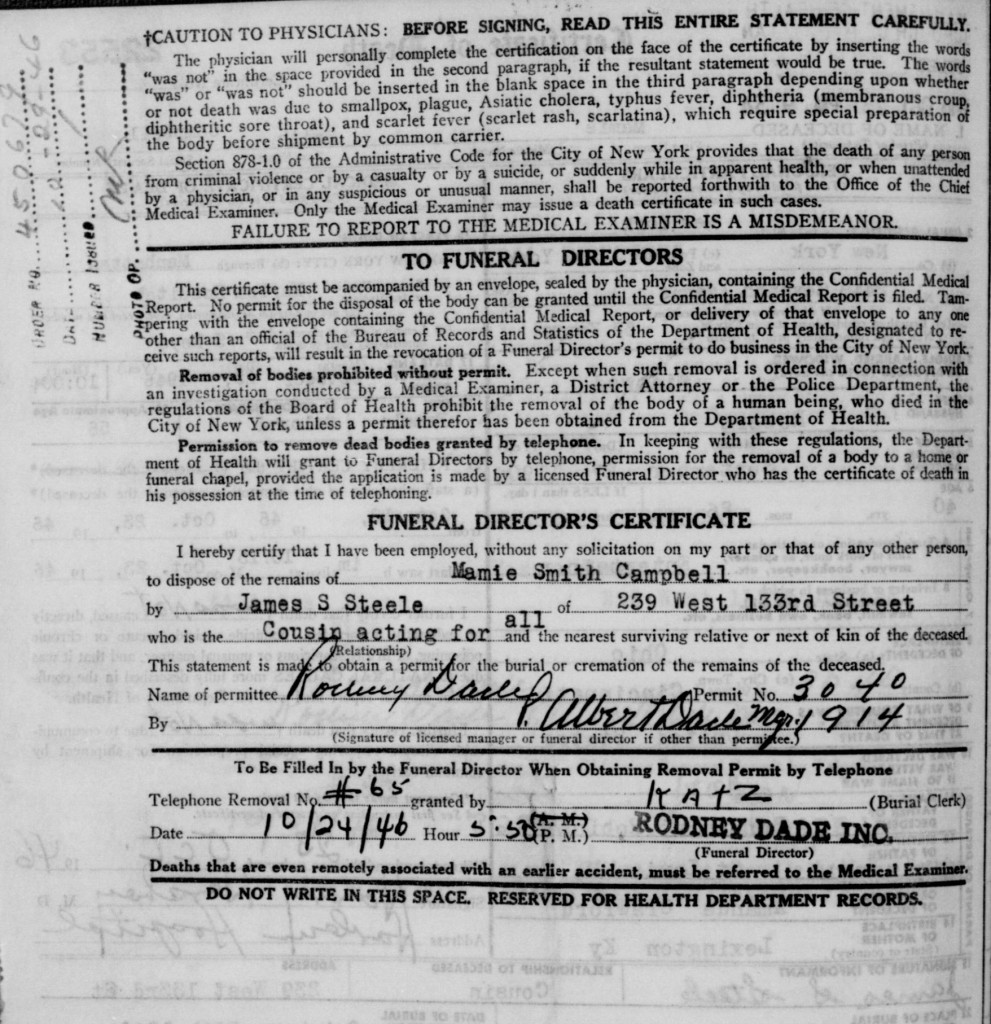
David W. McCain, a native of New Orleans, parlayed an interest in the female singers of the past into a lifetime of scholarship. He befriended and interviewed Teddy Grace and his fascination with the artistry of the Boswell Sisters prompted him to meet Vet Boswell in 1977. He collaborated with Vet’s granddaughter, Kyla Titus, to publish the sisters’ biography The Boswell Legacy in 2014. A documentary on the Boswell Sisters, Close Harmony, has recently been completed.






















